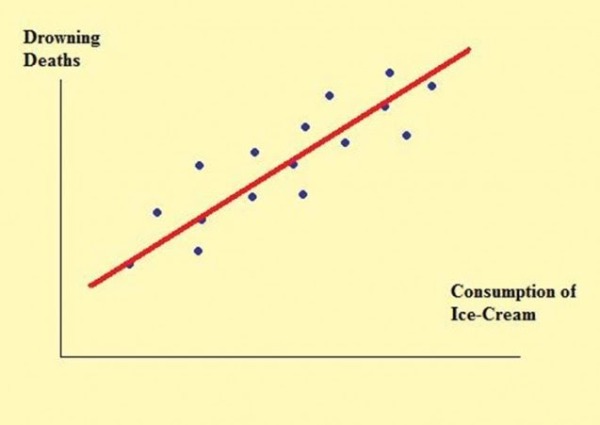Connect with us

Correlation vs Causation: Examples & Importance
Distinguishing correlation from causation is one of the most frequent mistakes made in reasoning.
These two words appear deceptively similar but identifying the difference between both can either make or break the process of creating a high-value product for your customers.
Let’s dive right in as I review correlation vs causation psychology and describe the main differences between these two common terms.
Table of Contents
Correlation vs Causation: Definition
What is Correlation?
Correlation is a relationship or connection between two or more objects. This relationship is not caused by chance. This term, used most often in statistics, refers to the degree of connection between any random variables.
If X and Y, two variables, tend to be observed at the same time, there’s a correlation between them. You cannot say X caused Y, you will simply say that when X and Y are observed together.
Types of Correlation
Positive Correlation:
- When variable X increases, variable Y also increases. Similarly, if X decreases, Y correspondingly decreases. This is a positive correlation.
- Example: the more subscribers on your website, the more traffic it has generated.
Negative Correlation:
- When variable X increases, variable Y decreases, or vice versa.
No Correlation:
- Both variables are unrelated. Any change in X leads to no change in Y or vice versa.
Bottom Line: Correlation answers whether or not 2 things will happen at the same time. It doesn’t imply causation. Sometimes, correlation can be referred to as a coincidence.
What is Causation?
Causation is the principle of a connection or a relationship between an effect and its causes. It implies that X & Y have a cause-and-effect relationship with each other.
- Unlike Correlation, the relationship is not because of a coincidence. We are saying that X causes Y or vice versa.
- It means that the existence of one variable causes the manifestation of another.
Bottom Line: Causation answers why 2 things or events will happen at the same time.
Causation vs Correlation: Examples
Let’s begin this section with the Correlation vs Causation Graph:

As you can see in the graph above, there is a correlation between the amount of ice cream consumed and the number of people who died because of drowning.
Now, I’d sound ridiculous if I say that ice cream consumption causes drowning, wouldn’t I?
In fact 'Summer Weather’ is the third variable, which is the causative agent in this scenario.
In warm weather, people tend to consume more ice cream and also swim more often, which leads to an increase in the number of drowning deaths.
- In this example, Variable X (Ice-Cream Consumption) did not cause the manifestation of Variable Y (Drowning Deaths). There was a coincidence. Hence X&Y has a correlation between them.
- If we introduce a Variable Z (Summer Weather), then we can see the cause-and-effect relationship between Variable Y (Drowning Deaths) and Variable Z (Summer Weather). Hence the Z & Y variable has a causation relationship between them.
Causation vs Correlation in SEO
We can apply the same distinction to SEO results. At Troop Messenger, we run an SEO analysis before writing any blog post. We do this analysis for a high number of factors, as we try to identify a correlation between those factors.
This allows us to review whether or not two different factors are changing in the same direction, at the same time, and also understand the influence level they have on each other.
A change in your website’s SERPs ranking could be due to causation or correlation with any of these factors:
Your SEO efforts
- Link-building technique
- Post optimization metrics
On-page optimization metrics
- SEO efforts of Your Competitors
- Employing white-hat SEO techniques
- Link-building technique
Google’s Algorithm updates
- Re-evaluation of site against new standards
How to use correlation and causation for SEO?
The difference between these two terms must be taken into consideration during SEO analysis, especially when trying to find causality among different factors.
Before judging the events, try to view them from different perspectives. While studying the SEO factors, develop more understanding of the relationships between events.
You might think that there is a correlation between higher rankings and large amounts of links. But, after a proper analysis, you’ll be able to distinguish it as a causality.
As you continue working more within this field, you’ll be able to assess and distinguish both these situations better.
3 Steps of generating meaningful data by tracking a few metrics
If you want a bigger and better perspective, you’d need to review tons of data. In the section below, I’ve explained 3-Steps of generating meaningful data by tracking a few metrics.
Step #1: Actively track all the factors
Track Your Keywords
- Create a correlation vs causation worksheet with a list of every single keyword you want to target, next to the page on which you’re using these keywords.
- Create an excel spreadsheet that records the same information for the Top 100 keywords that have generated traffic to your site.
Track On-Page Changes
- Every time you make a modification to the on-site optimization of any of your web pages, make an annotation in Google Analytics.
- This annotation should contain details about changes made and the dates on which they occurred.
Track the Links
- Create one more Create correlation vs causation worksheet to track the quality and number of inbound links that are reverting to your site
- Make note of the PageRank of the referring URL, root URL, and anchor text used in the link
- Changes in the distribution of such link metrics can cause SEO losses or gains.
Track all social Signals
- Number of Facebook, Instagram, Twitter, and other social media site followers
- Number of tweets, Instagram post views, and Facebook posts
- Number of URL mentions on all these platforms
- Number of profile “likes”
Step #2: Monitor your Competitor’s SEO changes
- Changes in the number, quality, and type of inbound links
- Changes in the number of indexed pages
- On-Site changes that cause a shift in your competitor’s SEO strategies
- Any new link-building technique
Step #3: Frequently compare changes in your rankings with your metrics
- Every time there’s a change in your site’s SERP ranking, compare the timing of these search results with quantifiable metrics.
- Tune your SEO strategy according to the activities that are likely to result in big SERPs gains.
Signing Off
So what have we learned from the correlation and causation definition and examples? These two deceptive terms are simply one of the common ways of testing whether two (or more) variables have an effect-and-cause relationship or are simply correlated to one another.
Are there any other correlation and causation examples you’d like to hear more about on the Troop Messenger blog? Is there correlation vs causation analyses that you’re interested in within the broader realm of digital marketing and search engine optimization? Let us know in the comments.
Share this post and don’t forget to follow us on social media!





.jpg)


